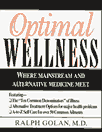- CLICK HERE TO VIEW DR. GOLAN'S ARTICLE ARCHIVE!
Estrogen
Metabolism and Broccoli
Q: I have
heard that broccoli can help to prevent breast cancer, but is it
any more protective to the breasts than zucchini or carrots?
A:
Although zucchini and carrots certainly contain nutrients beneficial
to health and I recommend including them in your diet regularly,
broccoli belongs to a special class of vegetables called cruciferous
vegetables. (Also in this family are brussel sprouts, cauliflower,
kale, collard, cabbage, and others).
Crucifers
have a particularly beneficial phytonutrient, called diindolemethane
(DIM). DIM has been shown to influence estrogen metabolism in a
manner that lessens cancer risk. It may not be estrogen per say
that is the danger, but the unfavorable byproducts of estrogen metabolism.
They have been related to cancers of the breast, uterus, cervix,
colon and prostate as well as lupus, fibrocystic breasts, endometriosis,
and PMS.
Biochemical
reactions in the body convert estrogen to several metabolites, some
pro-carcinogens (dangerous) and some anti-carcinogens (protective).
The dangerous metabolites are 16 alpha hydroxyestrone and 4 hydroxyestrone
whereas the favorable ones are 2 hydroxyestradiol and 2 hydroxyestrone.)
It is the relative amounts of these metabolites that determine the
cancer risk from estrogen. We can measure these in the blood or
urine.
Here
is where cruciferous vegetables come in: They can directly shift
estrogen metabolism away from the carcinogenic byproducts to the
protective byproducts. With regular crucifers in the diet and/or
DIM supplements we can actually decrease the risk of estrogen related
cancers (and other conditions), and for women who need or desire
supplemental estrogen, DIM can increase the safety of hormone replacement
therapy .
Article
Addendum: In my practice, I highly recommend testing estrogen metabolism
for any women with a family history or prior personal history of
breast, uterine or cervical cancer. I recommend it for women currently
on hormone replacement therapy (and who want to continue being on
hormones) because this information can help assess the risk of hormone
treatment. If estrogen therapy is desired or needed and the estrogen
metabolite results are not favorable, we are presented with several
choice: 1) We can discontinue the hormones and rely on phytonutrition
and lifestyle measures or 2) we can attempt, with aggressive nutritional
intervention, to make favorable shifts in estrogen metabolism and
help counter (again nutritionally) some of the risks from the dangerous
metabolites. We retest in 8 weeks. If successful, we can make the
choice to remain on hormones, and if not successful we discontinue
estrogen. I am beginning to recommend estrogen metabolism testing
for all women in my practice.
This information
is provided for educational purposes only and is not intended as
a substitute for professional advice. Although the material may
help you understand a diagnosis or treatment, it cannot serve as
a replacement for the services of a licensed health care practitioner.
Any application of the material set forth is at the reader's discretion
and sole responsibility.
Email
your questions for Dr. Golan to
use a subject for his website article.
[BACK
TO TOP]
© Copyright 1999-, Ralph Golan MD
All rights reserved.
Website design, hosting and maintenance by New Tech Web, Inc.
|
![]() Estrogen
Metabolism Tests
Estrogen
Metabolism Tests





